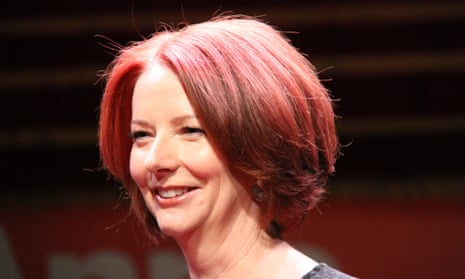Former prime minister Julia Gillard defended her controversial changes which moved single parents off their pension and on to the unemployment benefit Newstart, but she accepted Newstart was “too low”.
“I am going to stand up for it as a decision of the government I led,” she told journalist Anne Summers in Melbourne on Tuesday night.
It was the second major interview Gillard had done in as many days explaining her prime ministership, its policies, her leadership battles with Kevin Rudd and issues around gender. Summers also interviewed her in Sydney on Monday night. Both sellout audiences were overwhelmingly supportive and mostly women.
Gillard also took questions from the floor, discussing her misogyny speech, perceived bias in the press gallery, changes to Labor’s affirmative action rules, the work of Labor women’s organisation Emily’s List and whether she was bitter over losing the leadership.
However the major policy question centred around her explanation of her changes to the single parent pensions.
The policy, which attracted most criticism among traditional Labor voters, left single mothers between $60 and $100 a week worse off by shifting them off parenting payments once their youngest child turned eight. It was a decision which saved the government $728m over four years.
Gillard said the policy had become emblematic of the larger issues around unemployment and poverty. She said her motivation for the change was the “grandfathered” class of women who were not on the same payments as other women because of earlier rule changes to the pension.
“I formed the view that that was unfair and I felt we needed to have arrangements that most facilitated and helped women get into work when their children were of an older age, which is ultimately better for them and better for their children.”
Gillard said the policy change came to represent underlying issues, such as the low rate of Newstart and that the approach to bringing unemployed people back to work was not “flexible”.
“The rate of Newstart is too low and the approach we take to assisting people who are unemployed is not flexible enough,” she said.
Gillard also spoke about the carbon debate, which saw rallies outside the parliament with placards famously urging “Ditch the Witch” – rallies addressed by then opposition leader, Tony Abbott, and 2UE shock jock Alan Jones.
“I think it became an honesty issue because of the 2010 campaign and whilst in that campaign, we talked about an emissions trading scheme and pricing carbon and the need to address climate change, I hadn’t seen us getting there through a carbon tax.
“So the ‘no carbon tax under the government I lead’ became a very personal issue and an honesty issue and I do think I made a political error in conceding that what we introduced was a carbon tax.
“It is an emissions trading scheme with a fixed price for the first three years. Any iteration of a carbon trading scheme starts with a price that someone fixes.”
Gillard was asked how she felt about Australia’s most famous feminist academic Germaine Greer making derogatory comments about a “fat arse” and her choice of fashion.
“I was disappointed for her,” she said. “I grew up thinking Germaine Greer was just amazing and devoured what she wrote and followed her career and she was just this huge trailblazer to me as a young person. And for everything she’s done and everything she is and the great worth she has brought to our understanding of gender, I just thought it let her down as much as it let me down. So I was sad for that.
“To the extent that I ever got upset about people commenting on my appearance, boy, I’m through the pain barrier so it didn’t really worry me in that sense. I wasn’t personally hurt by it.”
Gillard was asked by an 11-year-old girl if, given the “misogyny”, she ever had fun as prime minister.
“I don’t want to make the whole thing sound Dickensian, like I was in some dark satanic mill. It wasn’t.”
Asked if she felt bitterness over Rudd winning back the prime ministership, Gillard said she was “at peace with it”.
“There’s always a decision to be made whether you will carry it for the rest of your life,” she said.
“We all know politics isn’t for the faint-hearted and most people get a leadership in controversial circumstances and lose it in controversial circumstances.”
Gillard said she got a phone call from former Labor prime minister Paul Keating.
“He said, ‘Love, we all get taken out in a box.’”

Comments (…)
Sign in or create your Guardian account to join the discussion